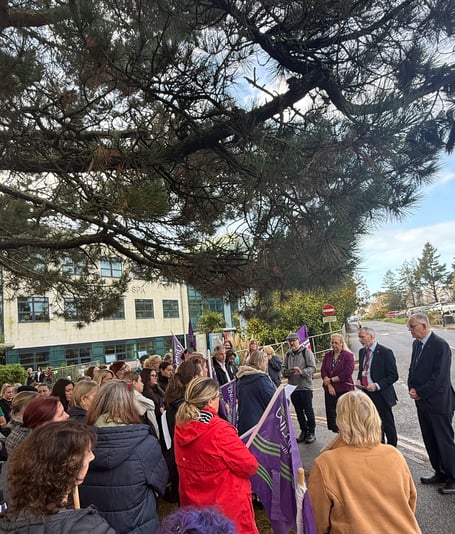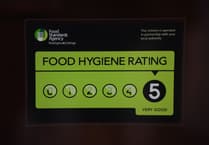AROUND 60 NHS staff angered by proposals by the Royal Cornwall Hospitals Trust (RCHT) to cut hundreds of jobs as part of a £49.3m cost-cutting exercise confronted the trust’s chief executive Steve Williamson ahead of a board meeting today (Thursday, November 6).
Mr Williamson was handed a collective staff grievance signed by 260 colleagues, a petition against the cuts signed by over 5,700 people and a pledge, which he was asked to sign. It stated: “I, Steve Williamson, on behalf of Royal Cornwall Hospitals Trust, pledge to stop all job cuts, outsourcing and restructuring.” Members of the Unison union don’t expect him to sign it.
Staff and union members gathered outside the Knowledge Spa at the Royal Cornwall Hospital in Truro, chanting “respect, compassion, honesty, teamwork” as board members arrived for their meeting. Mr Williamson, RCHT board chairman David Allen and chief people officer Alison Thorne-Henderson stopped to hear staff concerns.
Following previous staff protests and union intervention, a corporate services consultation and care group consultation which had been due to close at the end of last week have been extended until November 9. A clinical administration consultation has been paused but the trust is still hearing the views of staff in an engagement process rather than an official 45-day consultation. That feedback will lead to the trust deciding upon its next course of action.
During the meeting, Mr Williamson acknowledged the protest. He briefly summarised the range of matters concerned staff raised with him, claiming staff had spoken passionately, with conviction respectfully.
“They directly shared with us concerns with regards to the clinical administration consultation which had been underway. Those concerns covered potential impact that the proposals may have, in their view, around the quality of services, the performance of services and the efficiency of services.
“They also talked to us about the impact of the proposed changes on individuals, families and communities across Cornwall and the Isles of Scilly, and covered concerns with regards to how the engagement had been undertaken and with respect to if there is sufficient understanding of administration processes, and the impact on the direct delivery of care for patients who rely on the services we support.”
Mr Williamson added: “We were grateful for the opportunity to hear those concerns directly from staff members and we will need to give consideration to the collective staff grievance, petition and the other matters that were covered today and will bring that back to the board at the next opportunity.”
Before the meeting, protester Rachel Gerred-Hart, data and analytic lead for cardiology, told Mr Williamson: “Over 1,400 administrative and managerial staff have been placed into consultation. That represents not just numbers on a chart, but a wide range of essential roles: ward clerks, medical secretaries, booking officers, coordinators and service leads. Behind each role is a person who carries a part of the patient journey: ensuring results reach the right consultant, arranging transport for patients and spotting potential issues before they become problems.
“Removing or consolidating these posts doesn’t just ‘do more with less’, it introduces real risk into an already stretched system. Even small delays or gaps can affect patient safety, disrupt care pathways, and add stress for patients and families who are already anxious and vulnerable.
“Many of those affected have years, even decades, of service. Their experience is not just knowledge, it’s the memory, rhythm, and reliability of the organisation. Losing that means losing the quiet efficiency that ensures the Trust runs safely and smoothly every day.”
She added: “Efficiency is absolutely vital … we all agree on that. But when you trim the system too far, you have actually increased risk for the very people we are committed to protect and that’s the patients in frail health … families awaiting safe discharge, and a wider community that cannot simply turn to another hospital when the system cracks.”
Unison South West regional organiser Charlie Woods said: “Today’s lobby shows the strength of feeling among hospital staff. They are dedicated professionals who keep services running safely for patients every day.
“The trust’s decision to pause the consultation was the right one, but staff are clear that the plans must be abandoned entirely. There are better ways to manage financial pressures than by putting jobs and patient care at risk.”





Comments
This article has no comments yet. Be the first to leave a comment.